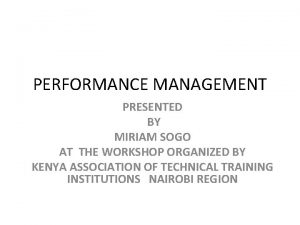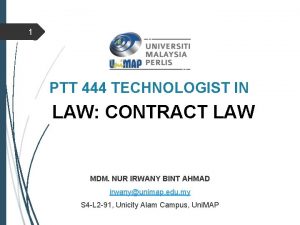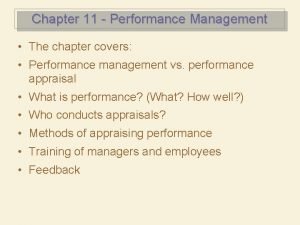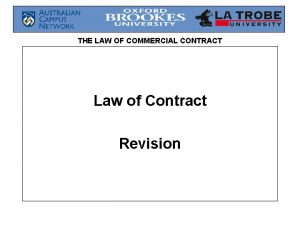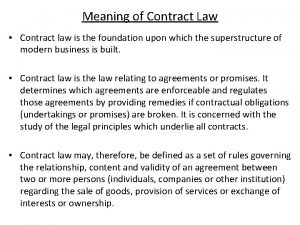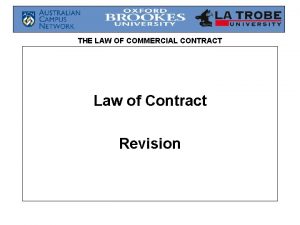LAW OF CONTRACT PREVENTION OF PERFORMANCE MORA CREDITORIS




























- Slides: 28

LAW OF CONTRACT PREVENTION OF PERFORMANCE & MORA CREDITORIS

Prevention of performance: Learning outcomes: Explain the nature of prevention of performance, with specific reference to the distinction between absolute and relative prevention of performance. � List and discuss the requirements for prevention of performance. � Distinguish between prevention of performance and other forms of breach of contract generally. � Discuss the specific consequences of prevention of performance. � Discuss cancellation on the grounds of prevention of performance. �

Study: � Van der Merwe et al Chapter 10 pp. 366 -369. � CASE: � Administrator, Natal v Edouard (A). 1990 (3) SA 581

Nature: � Conduct after conclusion of the contract by which the debtor makes it impossible for himself to perform. � Conduct: positive act or neglect to perform. � Impossibility may be total or partial. � Physically impossible, but also for all reasonable and practical purposes impossible.

Administrator, Natal v Edouard: � Medical doctor undertook to sterilise a patient immediately after the birth of her third child. � Doctor failed to perform sterilisation, with the result that the woman became pregnant again. � Doctor’s failure amounted to prevention of performance in terms of his failure to (successfully) sterilise the patient.

� Can occur before, on or after date set for performance. � Performance can be absolutely (objectively) or relatively (subjectively) impossible. � Absolute prevention predicts malperformance with absolute certainty. � Relative prevention anticipates malperformance only with reasonable certainty.

� Breach of contract in the form of prevention of performance is complete as soon as performance has been prevented.

Requirements: � Can only constitute breach if conduct infringes a contractual obligation and is therefore wrongful. � Vis maior, casus fortuitous: extinguishes the obligation. � Above: no breach, element of wrongfulness is excluded. � Fault is a requirement of prevention of performance.

Distinction from other forms of breach: � Mora: performance is still possible, however late. � Positive malperformance: Performance has been rendered, but is defective. Prevention takes place before performance. � Repudiation: predicts eventual malperformance with relative certainty, while prevention predicts malperformance with absolute certainty.

Specific consequences: � No order for specific performance can be granted. � If performance has become only partially impossible, a creditor can claim specific performance of possible part. � The debtor remains bound despite impossibility of performance. � Creditor may choose to uphold the contract or resile.

Mora creditoris: Negative malperformance by creditor. � Learning outcomes: � Shortly discuss the nature of mora creditoris. � List and shortly discuss the requirements for mora creditoris. � Distinguish between mora creditoris and other forms of breach of contract in general. � Critically evaluate and discuss the special consequences of mora creditoris.

Study: � Van der Merwe et al Chapter 10, p. 372. � CASES: � Pienaar v Boland Bank � LTA Construction v Minister of Public Works and Land Affairs.

Nature and forms: � CREDITOR wrongfully fails to render his co- operation to enable the debtor to perform. � Can occur before performance by the debtor.

Requirements: � LTA Construction v Minister of Public Works & Land Affairs: � 1. Performance must have been capable of being fulfilled. � 2. Debtor must have made proper performance or at least have tendered performance. � 3. Creditor must have failed to accept performance tendered or refused to co-operate with it being made.

� 4. The creditor or his employees must cause the delay. � 5. The creditor must be at fault (element of fault- intent or negligence). � Remember: Mora creditoris isn’t the only form of breach able of being committed by creditor. See examples on pp. 123 -124 of study guide.

Pienaar v Boland Bank: � Appellant borrowed an amount of money from the first respondent. � When debt had to be paid back, a third party paid the debt on behalf of the appellant. � Boland Bank as creditor refused to accept payment, since it was not made by the debtor himself.

� Court decided that if a third party performed on behalf of the debtor, it is seen as if the debtor him-or herself performed. � This would even be the case where performance was made by a third party against the wishes of the debtor.

The Principle of Reciprocity: � Exceptio non adimpleti contractus. � BK Tooling v Scope Precision Engineering.

What does the principle entail? � Obligations are reciprocal: Created “one in exchange for the other”. � Reciprocal contract: performance by a plaintiff is a REQUIREMENT for the enforceability of his claim for counter-performance. � Party to reciprocal contract may withhold performance in order to secure counterperformance. � The right to withhold performance: Exceptio non adimpleti contractus.

� It is an extraordinary remedy, not an action with which to commence litigation, but merely a “claim in replication”.

BK Tooling (Pty) Ltd v Scope Precision Engineering (Pty) Ltd: � FACTS: � At the end of 1973 the appellant received a drawing for the implementation of a rubber fitting tot the engines of certain Ford vehicles. � A company called Paulstra would manufacture such fittings and deliver same to Ford.

� In order to manufacture these fittings, Paulstra needed metal moulds. � The drawing received by the appellant from Paulstra provided complete measures, and allowed a tolerance of 0, 5 mm. � It was to be symmetrical, consisting of two identical halves that would fit on top of another.

� Appellant made the necessary drawings and at the end of 1973 requested the respondent to finalise the metal moulds to create a prototype. � Prototype was presented to Paulstra, who found it acceptable. � Paulstra then placed an order for 16 moulds at R 5000 each.

� The appellant only received the products on the 19 th of June 1974. � Appellant had not yet paid the respondent for the first order of moulds, and the respondent was unwilling to manufacture a second order. � Respondent also went overseas and only returned on the 20 th of July 1974. By that time, the appellant was already under huge pressure from Paulstra to deliver the order.

� On the 25 th of August 1974 Paulstra tested the moulds. They did not comply with the agreed specifications. � On the 16 th of August the respondent contacted the appellant for payment of the first order. The appellant refused to pay as the work was unsatisfactorily done.

� The respondent requested that the moulds be given back for rectification, but the appellant refused.

Application: � The appellant based his claim on the exceptio in denying that the plaintiff had “duly performed its obligations”. � Jansen JA mentioned a few “aspects” of the principle of reciprocity and its application by means of the exceptio.

� Continued in next lecture…
 What is mora creditoris
What is mora creditoris Prevention of performance
Prevention of performance Primary prevention secondary prevention tertiary prevention
Primary prevention secondary prevention tertiary prevention Ias 15
Ias 15 Contingent contract and wagering contract
Contingent contract and wagering contract Newton's first law and second law and third law
Newton's first law and second law and third law Si unit of newton's first law
Si unit of newton's first law Boyles law
Boyles law Constant of avogadro's law
Constant of avogadro's law Contract management best practices
Contract management best practices Possibility of performance
Possibility of performance Spms sample
Spms sample Performance of contract wikipedia
Performance of contract wikipedia Praja trivedi
Praja trivedi Technology applications ec-12
Technology applications ec-12 International contract law
International contract law Contract definition
Contract definition Legal definition of contract
Legal definition of contract Element of contract law
Element of contract law Reception of roman law in netherlands
Reception of roman law in netherlands Price variation clause
Price variation clause Ptt 444
Ptt 444 Bilateral contract example
Bilateral contract example Uncitral model law on electronic commerce
Uncitral model law on electronic commerce What is contingent contract
What is contingent contract Principles of reinsurance contract law
Principles of reinsurance contract law Parol evidence rule
Parol evidence rule Classification of contracts
Classification of contracts Chapter 11 performance appraisal - (pdf)
Chapter 11 performance appraisal - (pdf)














